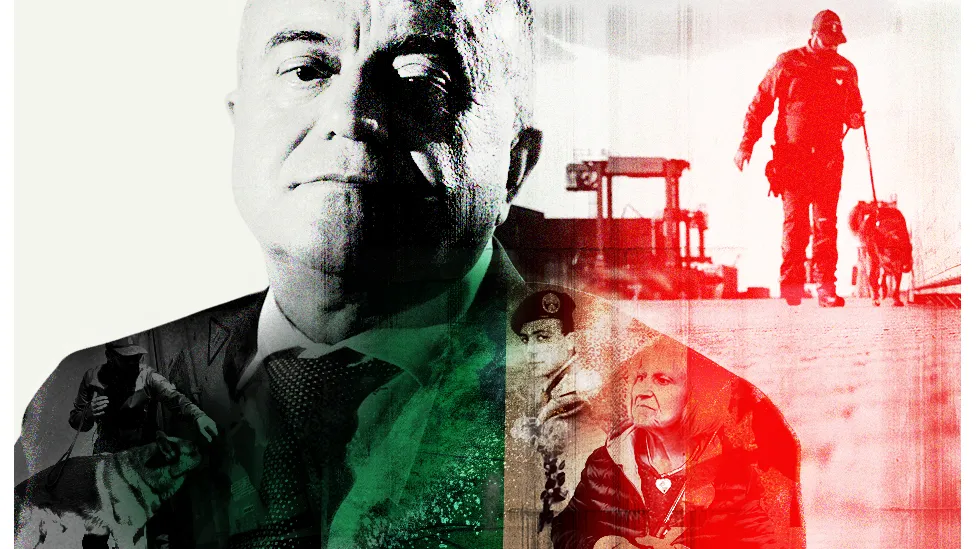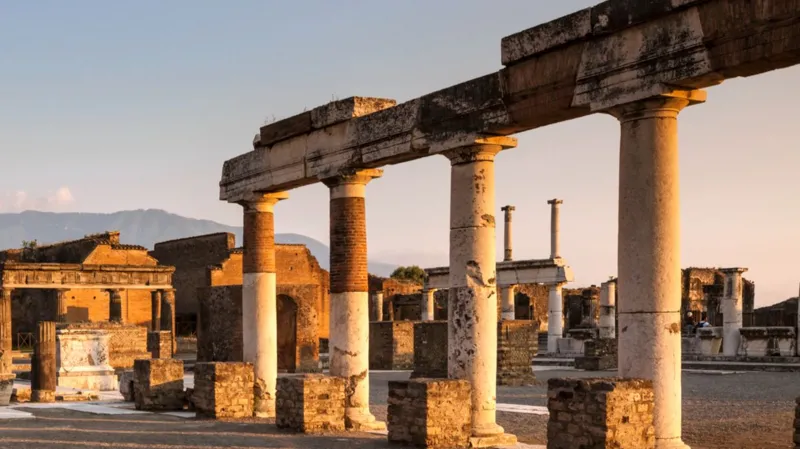Nicola Gratteri: The man on the kill list of Italy's most powerful mafia
Italy's highest-profile mafia target only tells us where to find him 20 minutes before we meet. Nicola Gratteri, the prosecutor leading the country's fight against organised crime, has learnt to live in constant danger - and too much advance warning leaves him exposed.

We are instructed to wait for him outside the court in the southern region of Calabria where he is overseeing the biggest trial of its kind since the 1980s. More than 330 suspects have been testifying there and 70 of them have already been convicted.
Suddenly Gratteri sweeps in, surrounded by his escort of five police cars. We thank him, a few times, for his readiness to meet and talk. "Stop thanking me - and let's get on with it," he snaps. "There's nothing I hate more than dead time."
'When I went to school I saw dead people in the streets'
The man on the kill list of Italy's most powerful mafia, the 'Ndrangheta, who has devoted his entire career to taking on the group, does not do pleasantries.
And then he decides to drive us to his office 40 minutes away. He will be freer to talk there. We climb into his bullet-proof car and so begins perhaps Italy's most dangerous commute.
"I've been living with this level of security since 1989, when my fiancee's house was shot at, and someone phoned her in the night to tell her she was marrying a dead man," he recalls. "It's escalated to reach this suffocating level of control."
There is no alternative, given what happened 30 years ago. In 1992, prosecutor Giovanni Falcone was blown up by a bomb planted beneath a motorway near Palermo by the Sicilian mafia, Cosa Nostra. It killed him, his wife and three police officers. His colleague Paolo Borsellino was assassinated by a car bomb two months later.
Their murders - and the searing images of the half-collapsed motorway at the scene of the Falcone attack - are still seen by Italians as a defining moment in their modern history. The magistrates are revered for their heroism and the brutality of the crimes remain a potent symbol of the mafia's capacity for terror.
With his eyes on the road, Gratteri tells me he thinks of the murdered judges often - and how they, too, were moving targets as they drove through another part of the country poisoned by organised crime. "I often talk to death, because you have to rationalise fear in order to move on," he says. "Otherwise, I couldn't do this job."
We speed across the rugged and lush toe of Italy: the bastion of the 'Ndrangheta since its origins in the 19th Century. The criminal syndicate is based around family clans, or 'ndrine, who traditionally controlled the mountain-top villages of the Calabrian landscape, their die-hard loyalty forged by blood ties.
While Sicily's Cosa Nostra and the Camorra around Naples are better known internationally, in part through their dramatic mass bombings, both have been weakened by a relentless police crackdown. As a result, the 'Ndrangheta has risen in their place and is now Italy's most potent mafia, with offshoots around the world, from South America to Australia, and an estimated annual turnover of around $60bn (£49bn).
Their currency is cocaine. The group dominates the global market and is now thought to control up to 80% of Europe's trade in the drug.
Most is funnelled through Gioia Tauro, Italy's busiest container port, a hulking facility in the south of Calabria. A fraction of the cocaine that arrives here is for the Italian market, with the rest passing through and onwards east, to the Balkans and the Black Sea. Military hardware bound for Russia has also been intercepted here.
We watch as a freshly arrived container carrying bananas from Ecuador is checked, first by sniffer dogs and then by officers from the Guardia di Finanza, or financial crime squad, who cut open boxes to rifle through the bunches of fruit. This shipment is clean - but many others are not, with the quantity of cocaine impounded here almost tripling in the past two years.
A recent police operation swooped on port workers suspected of being involved in a massive 'Ndrangheta trafficking ring. Thirty-five were arrested and seven tons of cocaine, with a street value of $1.4bn (£1.14bn), were seized.
We are given rare access to see the bulk of these drugs, which sit in a locked cell: hundreds of tightly wrapped packets that are photographed and then analysed.
A fragment of the white powder is cut away and placed into a tube containing a liquid solution, which is squeezed into testing kits that look like something from the pandemic - only this time detecting crime, not Covid. After a few seconds, a red line appears. It's positive, with a purity of 98%.
The cocaine seized by the Guardia di Finanza at Gioia Tauro port over the past two years accounts for more than half of their entire haul from the last two decades. 'Ndrangheta smuggling may be going up, but so too is police know-how, with forces collaborating across borders.
-bbc







